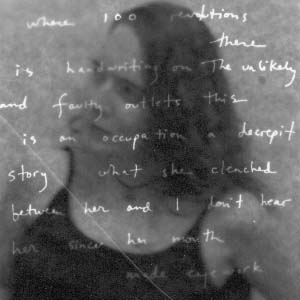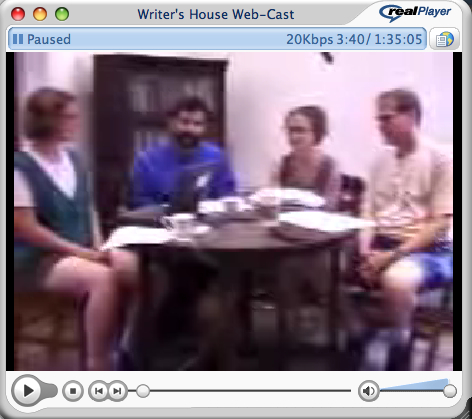I make a comment on Joan Didion's early sense of the failure of the American educational socialization to narrative. She described the experience as a breakdown, and sought to experience, in writing, the "breaking down" of writing. And then I ask her to read a passage on this same topic from the book she wrote about the death of her husband many years later.
On February 10, 1999, at a PhillyTalks episode featuring Heather Fuller and Melanie Neilson, Nielson mentions Fuller's "pretty gutsy" tendency to refer to artists in her writing, such as Claes Oldenberg. Here is Fuller's response:
'The really intriguing thing to me about Oldenberg is he was such a public figure. Everything for him was so hyperbolic. His sculpture sort of was upon you before you were even close to it. In a sense he was really holding court in a very public way with whosever was in eyeshot. It's often funny to me to think of Oldenberg in relation to, say, the person who is going to be uttering the line, in "hearsay", about the splatter guards from the civil disobedience unit of the police. To what extent is the splatter guard holding court? What extent is Claes Oldenberg forcing court upon us? These are all very public and visual elements that sort of force themselves into our space. And so, often there's a disconnect between these very forceful and—the word "power" you used, power—powerful elements and people who will perhaps not be reading this text.'
On July 8, 1999, we at the Writers House held our first live interactive webcast. The discussion was all about William Carlos Williams's "To Elsie" (the pure products of America go crazy) from Spring and All. I hosted and was joined by Bob Perelman, Shawn Walker, and Kristen Gallagher. We fielded questions from people watching on the internet, among them Jena Osman and Terrence Diggory.
It was streamed as video in RealVideo format and preserved as a video later in the same format. (Those who have RealPlayers installed still can watch the grainy video.) Later we extracted the audio from the video and now we've segmented that audio into topical segments. Here are the segments:
[] Bob Perelman reading "To Elsie" (2:21)
[] Kristen Gallagher on facing alterity (4:30)
[] Al Filreis on the poem's uncertainty (1:54)
[] Bob Perelman and Al Filreis on "the pure products of America" and the issue of control (5:26)
[] Shawn Walker, Al Filreis, Kristen Gallagher and Bob Perelman on Williams' position towards Elsie (6:44)
[] Bob Perelman and Al Filreis on imagination (8:26) audience comments and Bob Perelman on "peasant traditions" (3:17)
[] Bob Perelman on how the open architecture and "unsuccessful" quality of Williams' poems are relevant to poetics today
[] Al Filreis on Williams' attraction to the new "mixed" American culture
Here is the link to the page with links to audio and video.
PennSound's Williams page includes eight recordings of the poet reading this poem.
I’m interested in poetry of the ‘other tradition,’ as spoken about by Jerome Rothenberg or Marjorie Perloff or blogged by Al Filreis or Lemon Hound. It’s not simply contemporary work. It’s a way of reading poetry through types of restlessness of being in the world. It could be Pound translating “The Seafarer” or it could be Linh Dinh’s photo blog; the poet is engaging with the ‘soul of the world’ which he or she finds to be fucked up in some way or another. The stance of being against the zeitgeist. Saying that, I definitely am not a fan of all types of ‘rebellious’ / ‘disruptive’ poetry, whether abstruse or ‘slam’, just because it speaks out. Nor do I dislike the haiku of Basho or the ‘everydayness’ of Berrigan and the New Yorkers. I suppose the way I read these writers is that their voices are implicitly rejecting of what society-at-large was pimping at the time. I feel like the times are hurtful, solipsistic to a new level and cruel and ignorant to staggering degrees. Poetry is a way to make vision clear. What’s my fucked up version of Shelley? “Poets are the true legislators of the unacknowledged world.”
Andrew Whiteman is a Canadian musician and songwriter. Forming the Bourbon Tabernacle Choir in Toronto out of high school, he eventually left the band in 1993 after eight years and went on to produce a solo effort, Fear of Zen, in 1995, as well as an album with the band Que Vida in 1998. Leslie Feist subsequently invited Whiteman to collaborate with herself and what was then essentially the core of Broken Social Scene—Brendan Canning, Kevin Drew and Justin Peroff.[1] The chemistry was successful and Whiteman became one of the band's four members to consistently appear in every tour. Whiteman also fronts the band Apostle of Hustle with bassist Julian Brown and drummer Dean Stone.
I loved my old home page and I was sorry to have to give it up a few years ago for something spare and linky/listy. I concede that the sparer style works better but I miss the narrative clutter, a non-design enthralled by hyperlinking right there in the flow of words. That little "latest news" link in the top left blinked for about a year when that was the newest thing. Fortunately I knew that blinking links were bad news pretty quickly and reverted to plain old plain old as soon as the excitement faded. The old page dates back to 1994 and it looked more or less as you see above from 1994 until 2007 or '08! I maintain a link to it and I imagine that most of the links still work. Prior to the site on top of which this old page sat I had a wonderful gopher. This was of course before the graphical browser (Mosaic was the first, I think--before Netscape) and it was stiff and hierarchical but effective in conveying information and giving users a tour, in effect, of the material you wanted to present. I loved the chaos of hyperlinking once it was possible through this thing called "the world wide web" and, let me repeat, I felt that the hyperlinky text was the way to go. Eventually another kind of design became the standard. Now--what with drupal and blogs and blog-style user-enabled sites--we're back to a more cluttered surface, but still nothing like this single-look languagy flat surface.
Joan Didion on the rejection of the socialization to narrative in American education
I make a comment on Joan Didion's early sense of the failure of the American educational socialization to narrative. She described the experience as a breakdown, and sought to experience, in writing, the "breaking down" of writing. And then I ask her to read a passage on this same topic from the book she wrote about the death of her husband many years later.
Heather Fuller on Claes Oldenberg
PhillyTalks, 1999
On February 10, 1999, at a PhillyTalks episode featuring Heather Fuller and Melanie Neilson, Nielson mentions Fuller's "pretty gutsy" tendency to refer to artists in her writing, such as Claes Oldenberg. Here is Fuller's response:

1999 Symposium on WCW's "To Elsie"
The Pure Products of America Go Crazy
On July 8, 1999, we at the Writers House held our first live interactive webcast. The discussion was all about William Carlos Williams's "To Elsie" (the pure products of America go crazy) from Spring and All. I hosted and was joined by Bob Perelman, Shawn Walker, and Kristen Gallagher. We fielded questions from people watching on the internet, among them Jena Osman and Terrence Diggory.
 It was streamed as video in RealVideo format and preserved as a video later in the same format. (Those who have RealPlayers installed still can watch the grainy video.) Later we extracted the audio from the video and now we've segmented that audio into topical segments. Here are the segments:
It was streamed as video in RealVideo format and preserved as a video later in the same format. (Those who have RealPlayers installed still can watch the grainy video.) Later we extracted the audio from the video and now we've segmented that audio into topical segments. Here are the segments:
[] Bob Perelman reading "To Elsie" (2:21)
[] Kristen Gallagher on facing alterity (4:30)
[] Al Filreis on the poem's uncertainty (1:54)
[] Bob Perelman and Al Filreis on "the pure products of America" and the issue of control (5:26)
[] Shawn Walker, Al Filreis, Kristen Gallagher and Bob Perelman on Williams' position towards Elsie (6:44)
[] Bob Perelman and Al Filreis on imagination (8:26)
audience comments and Bob Perelman on "peasant traditions" (3:17)
[] Bob Perelman on how the open architecture and "unsuccessful" quality of Williams' poems are relevant to poetics today
[] Al Filreis on Williams' attraction to the new "mixed" American culture
Here is the link to the page with links to audio and video.
PennSound's Williams page includes eight recordings of the poet reading this poem.
The Other Tradition
Andrew Whiteman on Poetics
Per Larry Sawyer, Andrew Whiteman has asked the following:
Andrew Whiteman is a Canadian musician and songwriter. Forming the Bourbon Tabernacle Choir in Toronto out of high school, he eventually left the band in 1993 after eight years and went on to produce a solo effort, Fear of Zen, in 1995, as well as an album with the band Que Vida in 1998. Leslie Feist subsequently invited Whiteman to collaborate with herself and what was then essentially the core of Broken Social Scene—Brendan Canning, Kevin Drew and Justin Peroff.[1] The chemistry was successful and Whiteman became one of the band's four members to consistently appear in every tour. Whiteman also fronts the band Apostle of Hustle with bassist Julian Brown and drummer Dean Stone.
Lament for My Late Page
I loved my old home page and I was sorry to have to give it up a few years ago for something spare and linky/listy. I concede that the sparer style works better but I miss the narrative clutter, a non-design enthralled by hyperlinking right there in the flow of words. That little "latest news" link in the top left blinked for about a year when that was the newest thing. Fortunately I knew that blinking links were bad news pretty quickly and reverted to plain old plain old as soon as the excitement faded. The old page dates back to 1994 and it looked more or less as you see above from 1994 until 2007 or '08! I maintain a link to it and I imagine that most of the links still work. Prior to the site on top of which this old page sat I had a wonderful gopher. This was of course before the graphical browser (Mosaic was the first, I think--before Netscape) and it was stiff and hierarchical but effective in conveying information and giving users a tour, in effect, of the material you wanted to present. I loved the chaos of hyperlinking once it was possible through this thing called "the world wide web" and, let me repeat, I felt that the hyperlinky text was the way to go. Eventually another kind of design became the standard. Now--what with drupal and blogs and blog-style user-enabled sites--we're back to a more cluttered surface, but still nothing like this single-look languagy flat surface.